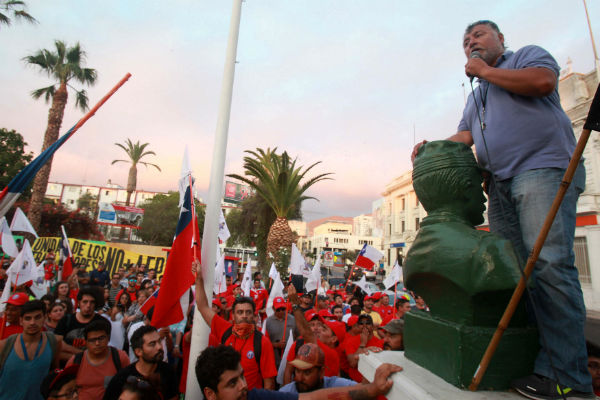Most of 2,500 workers to remain on strike: Union

SANTIAGO (Reuters) — BHP Billiton may try to restart production at the world's No.1 copper mine Escondida in Chile using temporary workers once the strike surpasses 30 days, the company told a local radio station on Wednesday.
If their safety could be assured "there is the option of using contractors' help to try to get production going" and it will be evaluated day by day, Escondida's corporate affairs director Patricio Vilaplana told Teletrece in an interview.
Local media reported that the company is considering a two-pronged approach as the strike approaches the 30-day mark on Friday — submitting a new contract offer that deals with some of the union's concerns, and restarting output.
BHP declined to comment.
The strike is already the longest in Escondida's history, boosting global copper prices on tighter supply expectations and leading smelters to cut fees. The mine produced over 1 million tonnes of copper last year, around 5 per cent of the world's total.
The union is confident the bulk of its 2,500 members will not break ranks and accept an offer from the company, said union spokesman Carlos Allendes. After 30 days, under Chilean law, unionized workers have the right to break from the union position and accept the company offer.
The two sides still seem far apart after government-mediated negotiations last month failed after a few hours.
No fresh talks are scheduled, Chile's Mining Minister Aurora Williams told Reuters on the sidelines of a mining conference in Toronto this week.
"(The government) is available at all times. However, there needs to be the willingness from both parties to sit down and have a discussion," she said.
The stoppage began on Feb. 9 after contract talks between the company and union collapsed, with the main disagreements centered on the status of new workers and planned changes to shifts and benefits.
BHP has previously said it would not use replacement labor for the first 30 days, as it has sought to keep a lid on simmering tensions and avoid violent clashes.
Few striking workers are expected to cross picket lines and work alongside temporary contractors, given that over 99 per cent of the unionized workers initially voted to strike, an unusually high level of support.
The union has built a camp for striking workers complete with cinema and sports arena high in the Atacama Desert on the mine's outskirts, and union leaders have said they have the funds to continue for some time.
"What's keeping the workers going at the moment? The perception that they're going to lose and job security will be in doubt ... that makes you think twice if you want to go back," said Allendes.




